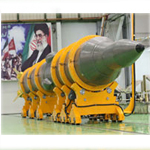Azerbaijan, Baku, Dec. 24 / Trend D. Khatinoglu /
After the IAEA board of governors approved the next resolution on the Iranian nuclear program on September 26, Tehran announced about creation of another 10 new centers for uranium enrichment, as well as testing Sadzhil ballistic missile (Sejil). All this has caused serious concern of the West.
Iran has tested missiles 'Prophet Akram II' six months before the meeting of the permanent members of the UN Security Council.
The West is sure of the military orientation of the Iranian nuclear program, by linking it with the production of ballistic missiles in this country. Iran denies all accusations.
Ex-director of the Israeli Atomic Energy Commission Uzi Eilama said not only the West, but the intelligence services of many other countries are sure that Iran is striving to achieve success in the production of nuclear weapons.
Eilam does not exclude the possibility for Iran to produce not only missiles, but nuclear bombs, similar to those used by the United States while bombing Hiroshima and Nagasaki.
The first practice of missiles tests was conducted by Tehran during the war with Iraq in 1980-1988. That time Iran bombed Iraqi cities within 50 days by 20 short-range missiles, purchased in Libya. After the war, Tehran launched production of Shahab-1, Shahab-2 missiles by buying some details from China, Russia and North Korea. In 2003, Iran has started its production in industrial scale after it conducted successful tests of Shahab-3 with range of 1,200 kilometers in 2000.
In May 2009, the country first tested a rocket Sadzhil (Sejil), acting on solid fuel and mobile platform. As opposed to "Shahab", this missile is on the mobile platform. Therefore, it is difficult to destroy it before the shot. Moreover, it is always ready for combat (10 minutes are required to load the liquid fuel in Shahab missile). The second tests of Sadzhil-2 were held last week.
Moreover, Sadzhil differs from the Shahab-3 by its two stages.
Besides explosives, Iranian missile warheads can also contain Non-conventional materials, including a nuclear warhead, Iranian professor at the University of Glasgow Reza Taghizadeh told Trend .
If Iran manages to install a nuclear warhead on missiles, the international security will face a serious threat. "At present, Iran has increased the number of its missiles and tries to bring them to a range of up to 2,000-3,000 kilometers," Senior Research Fellow at the Israeli Institute for national security studies Eilam said via e-mail.
Taghizadeh said Iran tests missiles in its territory. "The distance between the most distant borders of Iran is 2,200 kilometers. Therefore, it is impossible to say exactly that Iran is testing missiles aimed at a distance of over 2,000 kilometers," Taghizadeh told Trend over phone.
Israeli expert Eilam is sure that the missile Sadzhil-2 has a range of more than 2,000 kilometers. It was tested twice. "This is another action of the Iranian authorities aimed at the production of missiles with greater range," he said.
The expert does not believe that Iran is using long-range missiles only for ordinary explosives.
Israeli experts Eylam sure that the missile Sadzhil-2, twice has been tested, has a mission radius of more than 2000 km. "This is another step of the Iranian authorities aimed at the production of missiles with greater range," - he said.
Judge does not believe that Iran is using long-range missiles only for common explosives.
However, both experts believe in Iran's ability to install nuclear warheads on missiles. Eilam said it is unknown how the official Tehran will reach it and what the objectives of the country are. Israeli expert also added that Iran's military plans are kept in secret and, despite suspicions, nobody can say when and how the country will create a nuclear bomb.
U. Sadikhova contributed in the article.






